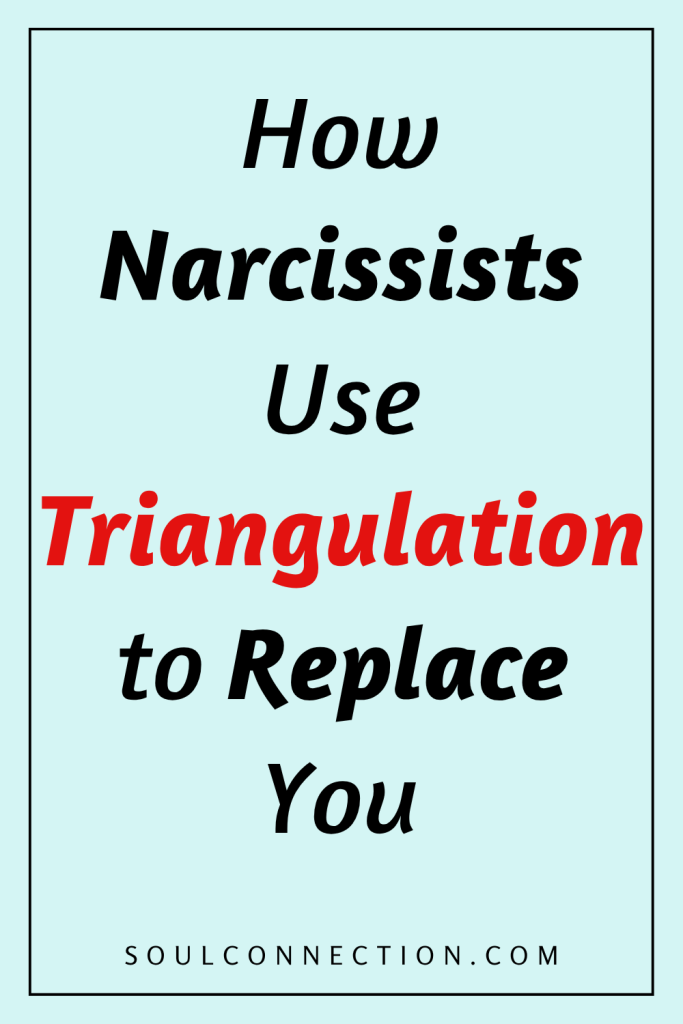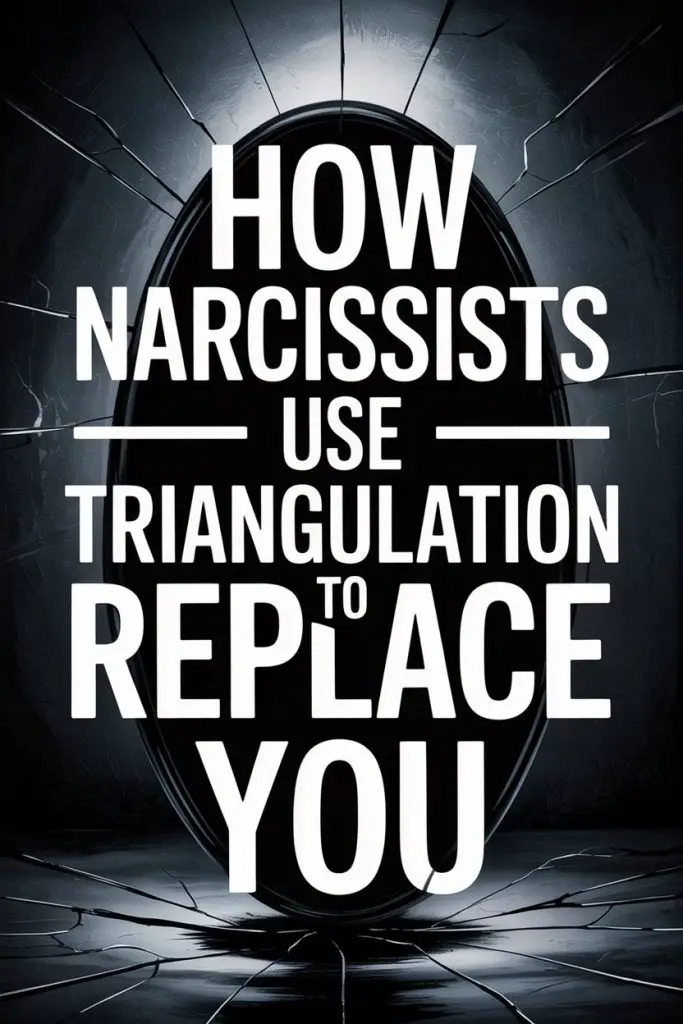Seen a narcissist’s relationship drama unfold and thought, “Wow, that’s messier than my sock drawer?”
Welcome to the world of triangulation—a sneaky maneuver that leaves even the sanest people clutching their phones with a mix of confusion and indignation.
If you’ve ever felt inexplicably sidelined, blamed for things you didn’t do, or suddenly replaced by someone who seems to have walked straight out of a narcissist’s fantasy, you’re in the right place.
Let’s roll up our sleeves and unpack how narcissists use triangulation not just as a weapon, but as a full-blown replacement strategy—and what you can do (short of moving to the moon) to protect yourself.
What Triangulation Actually Looks Like
Ever felt inexplicably in competition with someone else, even though you thought your relationship was exclusive—romantic or otherwise? Welcome to triangulation, the narcissist’s home turf.
It’s a mind game where a third person (or sometimes, an entire committee) is subtly or not-so-subtly introduced into your dynamic.
It might be an ex who suddenly pops up “just as a friend,” a new coworker who receives endless praise, or even a parent-in-law who seems to hold the golden ticket to your partner’s affection.
The end goal: keep you off-balance, anxious, and fighting for scraps of attention.
The Narcissist’s Game Plan
Narcissists love a good audience. The more drama, the better. Triangulation offers them multiple benefits: a loyal fan club, a source of endless validation, and, most importantly, leverage over you.
Suddenly, your every move is being compared—not always openly, sometimes just through a raised eyebrow or a well-timed sigh. The message is clear: “Watch out, you’re replaceable.” Charming, right?
The Subtle “Replacement” Phase
This isn’t always about grand gestures.
Sometimes, it’s the little things—inside jokes you’re not part of, plans you hear about only after they’ve happened, or praise for someone else’s qualities that sound suspiciously like the things you used to be admired for.
These micro-cuts add up. Gradually, you find yourself on the outside, looking in. The narcissist has rewritten the script, and—surprise!—your part has been recast.
Why Narcissists Replace Instead of Repair
Repairing a relationship? That would require self-reflection. Maybe an apology. Actual work.
Not exactly in a narcissist’s toolbox. Swapping out people is so much easier. New supply, new ego boost, zero accountability.
When the shine wears off for the new person—and it always does—the cycle starts again. Rinse, repeat, and hope the rest of us stocked up on popcorn.
The Role of Social Media in Triangulation
Nothing says “upgrade” like a flurry of selfies with the new muse, strategically timed for maximum audience impact. Social media is a narcissist’s playground.
Instant validation, instant jealousy, and a queue of eager onlookers.
Those Instagram stories? Carefully curated bait. The “just friends” tag on Facebook? A smokescreen for the main event.
If it feels like you’re watching your own replacement in real time, you probably are.
Gaslighting and Triangulation: The Terrible Duo
Ever confronted a narcissist about this new person, only to be met with: “You’re imagining things”? Or maybe, “Why are you so insecure?” Welcome to gaslighting, triangulation’s evil twin.
This combo leaves you doubting your own sanity, apologizing for your hurt feelings, and convinced that if only you were better/sexier/smarter, none of this would be happening. Spoiler: it would.
Signs You’re Being Replaced
Not sure if you’re the star of this tragicomedy? Watch for these red flags:
- Conversations constantly referencing the new person
- Sudden lack of interest in your opinions or plans
- Invitations drying up (“Oh, I thought you were busy”)
- Your achievements ignored, while theirs are celebrated
- An inexplicable feeling you’re being “graded” against someone else
- Your gut screaming, “Something’s off”
Why It Feels So Personal
Triangulation is, by design, an attack on your sense of worth. It’s meant to make you compete for the narcissist’s affection until you don’t even recognize yourself anymore.
The sting comes from the narcissist’s uncanny ability to know exactly which buttons to press. One minute, you’re the favorite; the next, you’re fighting for a spot on the roster.
What Keeps Us Hooked
Spoiler: It’s not because you’re weak, naive, or needy. The narcissist’s attention is handed out like treats on Halloween—random, infrequent, but just enough to keep you showing up at the door.
Add in the constant comparisons and the hope that, if you just try harder, things will go back to how they were, and you’re basically stuck in a loyalty trap. Most of us have been there. It’s exhausting.
How to Break the Spell
Reclaiming your sanity starts with calling this nonsense out for what it is. Easier said than done, but here’s where the rubber meets the road:
- Name the behavior (in your own mind, if not out loud): “This is triangulation. Not my circus, not my monkeys.”
- Resist the bait. Refuse to compete. When you stop playing the game, the narcissist loses power.
- Reconnect with reality. Phone a friend. Journal. Stand outside and scream into the void if it helps.
- Set boundaries, and enforce them like a bouncer at a dodgy nightclub.
- Find your people—the ones who remind you of your worth, not the ones who make you question it.
When the Replacement Is Someone You Know
Few things cut deeper than being swapped out for a friend, coworker, or even a family member. Betrayal with a side of humiliation.
The narcissist will often keep you close enough to watch the show, just to twist the knife. Don’t take the bait. Decline the invitation to the circus. The “main character” energy was never worth it.
The New Supply: Don’t Blame Them
It’s tempting to direct all your frustration at the new person. Truth be told, they’re being sold the same fairy tale you once were. Most aren’t aware they’re pawns in a well-rehearsed routine.
Focus on healing, not hating. The main villain here prefers mirrors to self-reflection, anyway.
Will They Come Back After Replacing You?
Short answer: probably. Once the new supply starts noticing the script—the love-bombing, the triangulation, the tantrums—the narcissist will likely circle back to see if the door’s still open.
Tempting as it might be to reply with a Shakespearean monologue, a simple, “New number, who dis?” usually does the trick.
Why Boundaries Are Your Best Friend
Nothing makes a narcissist crosser than a door that won’t budge. Boundaries aren’t about keeping people out—they’re about keeping your sanity in.
If you struggle to say “no,” start small. Practice in the mirror, with the cat, or at the supermarket checkout. Progress is progress.
Healing After Replacement
Getting replaced is brutal. There’s grief, anger, sometimes a powerful urge to start a side hustle as a private investigator. All normal reactions.
This is the time to focus on yourself. Rediscover hobbies, reconnect with old friends, and be gentle with your battered heart.
The narcissist moved on because that’s their nature—not because you weren’t enough.
Rewriting the Script
The magic (and misery) of triangulation is that it’s all about control. The moment you stop responding to the puppet strings, the narcissist has to find a new act. Trust me, they’ll try, but you’ll be too busy living your life.
Be your own main character. The show must go on, but you get to pick the cast.
Moving Forward—Without the Drama
Triangulation isn’t about love, it’s about power. Once you spot the pattern, you’re no longer a pawn on the narcissist’s chessboard.
Pour yourself a cuppa, phone a mate, and remember: the only triangle you need in your life is a slice of cake, a good book, and a friend who doesn’t make you audition for their affection.
The standing ovation? That one’s for you.


